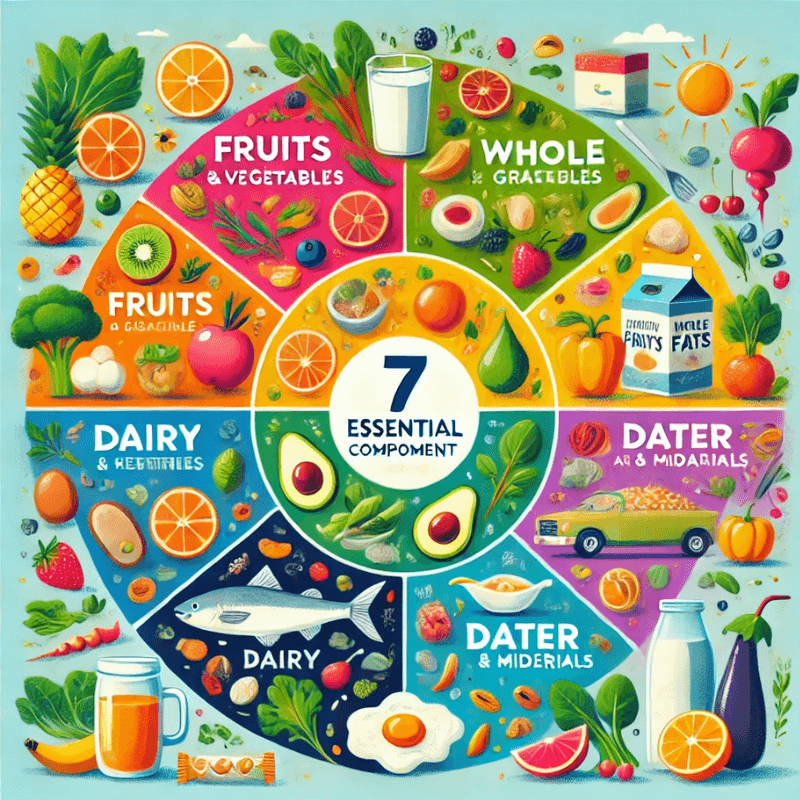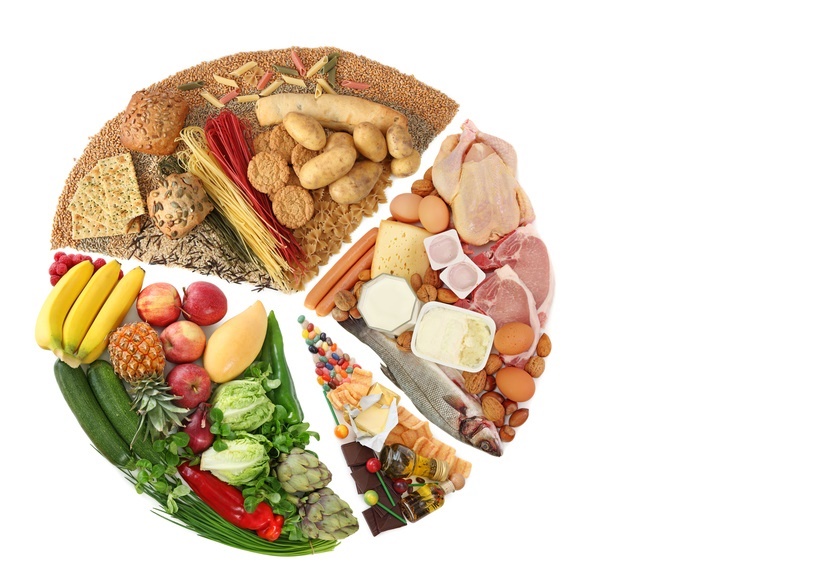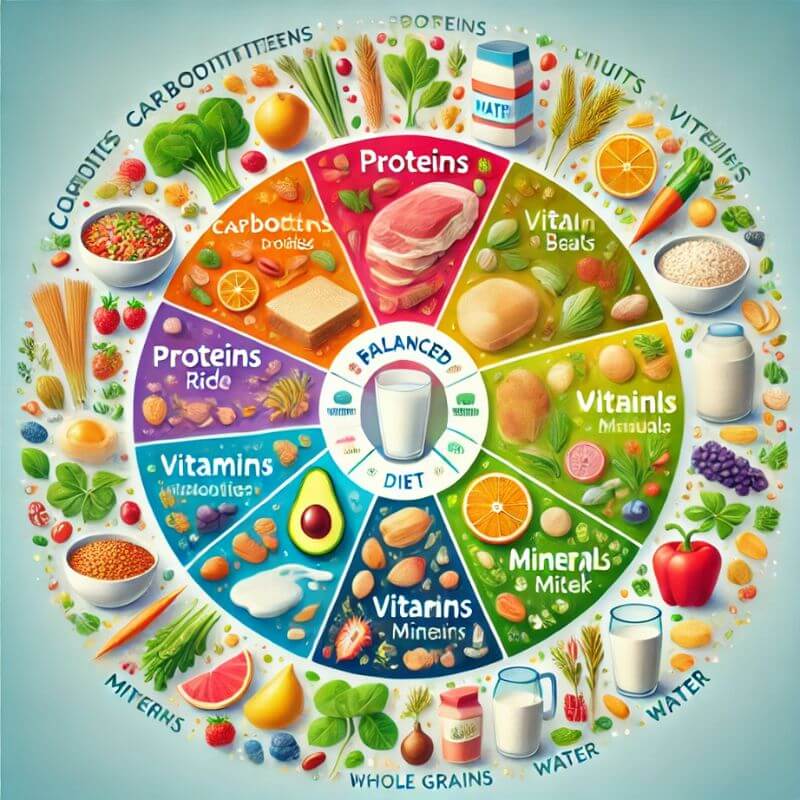What is Balanced Diet? A balanced diet is one that includes all the major food groups in the right proportions. The main food groups are carbohydrates, proteins, fats, vitamins, and minerals. Each of these nutrients plays an important role in keeping our bodies healthy.
A balanced diet is a diet that includes all the nutrients your body needs to function properly. These nutrients include protein, carbohydrates, fat, vitamins, minerals, and water.
Eating a balanced diet is important because it helps your body get the energy it needs to function properly.
It also helps you maintain a healthy weight, avoid diseases and illnesses, and feel your best.
There are many different ways to eat a balanced diet. You can follow a specific diet plan like the Paleo Diet or the Mediterranean Diet.
Or you can simply make sure to eat a variety of healthy foods from all the food groups.
Some tips for eating a balanced diet include: eating plenty of fruits and vegetables, choosing lean proteins, avoiding sugary drinks and snacks, and limiting processed foods. If you’re not sure where to start, talk to your doctor or a Registered Dietitian for more information on how to create a balanced diet that’s right for you.
What is A Balanced Diet?
What is the Meaning Balance Diet?
When it comes to eating healthy, the term “balance diet” gets thrown around a lot. But what does it really mean? A balance diet is one that includes all the major food groups in the right proportions.
That means eating plenty of fruits, vegetables, whole grains, low-fat dairy, lean protein and healthy fats. It also means limiting foods high in sugar, sodium and saturated fat. This type of diet provides your body with all the nutrients it needs to function properly.
The benefits of following a balanced diet are numerous. Eating a variety of nutrient-rich foods helps reduce your risk of developing chronic diseases such as heart disease, stroke and diabetes. It can also help you maintain a healthy weight, lower your cholesterol levels and keep your blood pressure in check.
Getting all the nutrients your body needs from a balance diet can also help improve your mood and energy levels, sharpen your thinking and memory and promote better sleep. Making sure you eat a balance diet doesn’t have to be complicated or time-consuming. Start by filling half your plate with fruits and vegetables at every meal.
Add whole grain breads or pastas, low-fat proteins like chicken or fish and small amounts of healthy fats such as olive oil or nuts. And don’t forget to include dairy products like milk or yogurt for calcium and vitamin D. By following these simple tips, you can easily create nutritious meals that will help keep you feeling your best!
What is Balanced Diet And Examples?
A balanced diet is an eating plan that includes all the food groups and provides the body with the nutrients it needs. A healthy diet contains a variety of fruits, vegetables, whole grains, low-fat dairy products, lean protein sources, and healthy fats. It is important to eat a variety of foods from each food group to get all the nutrients you need.
Most people should aim for a daily calorie intake that is appropriate for their age, sex, and activity level. The number of calories you need may vary depending on these factors. For example, someone who is very active may need more calories than someone who is less active.
To maintain a healthy weight, your calorie intake should be equal to the number of calories you burn each day. You can calculate your calorie needs by using an online calculator or by speaking with a registered dietitian. If you are trying to lose weight or prevent weight gain, you will need to consume fewer calories than you burn each day.
This can be accomplished by reducing your portion sizes, eating more nutrient-dense foods (such as fruits and vegetables), and being more physically active. Here are some examples of a balanced diet: Fruits: apples, bananas, oranges
Vegetables: carrots, broccoli, tomatoes
Grains: whole wheat bread, brown rice
Dairy: low-fat milk or yogurt
What are the 7 Things You Need for a Balanced Diet?

A balanced diet is one that includes all seven of the essential nutrients: carbohydrates, proteins, fats, vitamins, minerals, water and fiber. Here’s a closer look at each of these nutrients and why your body needs them:
1. Carbohydrates: Carbohydrates are the body’s main source of energy. They are found in foods like bread, pasta, rice, potatoes and cereals.
2. Proteins: Proteins are needed for the growth and repair of tissues in the body. They are found in meats, poultry, fish, eggs and dairy products.
3. Fats: Fats provide energy and help to absorb some vitamins and minerals. They are found in oils, butter, margarine, nuts and seeds. 4. Vitamins: Vitamins are essential for many functions in the body including immunity, vision and bone health.
They are found in fruits, vegetables as well as fortified foods like cereals and milk. 5 . Minerals: Minerals like iron and calcium are important for proper growth and development as well as good health overall.
What is a Balanced Diet And Why is It So Important?
Every person needs a certain number of calories and certain nutrients in their diet to stay healthy. Following such a diet is very important for your overall health and happiness. A balanced diet should include foods from each food group, such as fruits, vegetables, whole grains, lean protein, and low-fat dairy products.

Credit: www.nutraingredients.com
Balanced Diet Food List
A balanced diet is one that includes all the major food groups in the right proportions. It is important to eat a variety of foods from each group to get all the nutrients your body needs. The major food groups are:
1. Grains
2. Vegetables
3. Fruits
4. Dairy
5. Protein (meat, beans, nuts)
Here is a list of some specific foods that you can include in your diet to make sure you are getting all the nutrients you need:
Why is a Balanced Diet Important
It’s important to eat a variety of foods for many reasons. It helps you stay at a healthy weight, gives you more energy, and reduces your risk of getting sick. Choosing a variety of foods will ensure that your body gets all the nutrients it needs to function at its best. Vitamins, minerals, protein, carbohydrates, fat, and water are all examples of nutrients. Not getting enough of these important nutrients can cause health problems. For example, not getting enough vitamin C can cause scurvy, and not getting enough iron can cause anemia. Eating a healthy diet can also help prevent long-term diseases like heart disease, stroke, diabetes, and some types of cancer.
Balanced Diet Wikipedia
A balanced diet is one that provides the body with all the nutrients it needs to function properly. The three main food groups are carbohydrates, proteins, and fats. Each of these nutrients has different functions in the body and so it is important to consume a variety of foods from each group in order to get all the nutrients you need.
Carbohydrates are essential for providing the body with energy. They are found in foods such as bread, pasta, rice, potatoes, and cereal. Protein is needed for growth and repair of tissues.
It can be found in meat, poultry, fish, eggs, dairy products, beans, and nuts. Fat is an important source of energy and helps to protect organs and keep them functioning properly.
Balanced Diet Nutrients

There is no one-size-fits-all diet, but there are certain nutrients that we all need in order to stay healthy. A balanced diet should include:
1. Carbohydrates: These are the body’s main source of energy and include foods like bread, pasta, rice, potatoes, and cereal.
2. Protein: This nutrient is essential for growth and repair of tissues and can be found in meat, poultry, fish, beans, eggs, and nuts.
3. Fat: Although it has gotten a bad rap in recent years, fat is an important part of a healthy diet. It provides energy and essential fatty acids that the body needs to function properly.
Just be sure to choose healthy fats like olive oil or avocados instead of unhealthy ones like saturated or trans fats. 4. Vitamins and minerals: These micronutrients are essential for many different functions in the body including metabolism, immunity, and bone health. You can get them from eating a variety of fruits and vegetables as well as taking a daily multivitamin supplement.
Balanced Diet Pdf
A balanced diet is one that includes all the essential nutrients in the right proportions. It is important to have a balanced diet because it helps to ensure that our bodies get all the nutrients they need to function properly. There are many different ways to achieve a balanced diet, but one of the most effective is to follow a healthy eating plan.
There are several key components of a healthy eating plan, but three of the most important are: choosing healthy foods, portion control, and getting regular exercise.
When it comes to choosing healthy foods, it is important to focus on nutrient-rich options. These include fruits, vegetables, whole grains, lean proteins, and low-fat dairy products.
It is also important to limit your intake of unhealthy fats, added sugars, and refined carbs.
Portion control is another important aspect of maintaining a balanced diet. This means eating only as much food as your body needs at each meal or snack.
It can be helpful to use smaller plates and bowls when dining so that you don’t overeat. And be sure to listen to your hunger cues – if you’re feeling full before finishing your meal or snack, don’t force yourself to finish it just because it’s there in front of you.
Finally, regular exercise is an essential part of any healthy lifestyle – including a balanced diet!
Exercise helps us burn calories and improve our overall health. So make sure to get at least 30 minutes of moderate-intensity aerobic activity (like brisk walking or biking) most days of the week. Strength training 2-3 times per week can also help you maintain a healthy weight and improve your bone health.
Define Balanced Diet With Example
A balanced diet is one that provides the body with all the nutrients it needs to function properly. This includes a variety of different foods from each of the food groups, as well as an adequate amount of calories. For example, a typical daily diet might include:
-Grains: 6-8 ounces -Vegetables: 2-3 cups -Fruits: 1-2 cups
-Dairy: 3 cups -Protein: 5-6 ounces
Conclusion
A balanced diet is one that provides the body with the nutrients it needs to function properly. Macronutrients, such as carbohydrates, proteins, and fats, are essential for the body to build and repair tissues, produce energy, and regulate hormones. Micronutrients, such as vitamins and minerals, are also necessary for proper body function.
Consuming a variety of foods from all food groups in the right amounts is the best way to get all the nutrients your body needs.

